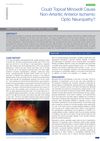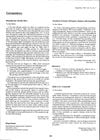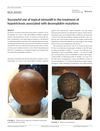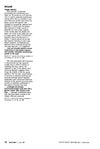 19 citations,
September 1989 in “Journal of The American Academy of Dermatology”
19 citations,
September 1989 in “Journal of The American Academy of Dermatology” Minoxidil treatment may cause hair loss.
 18 citations,
January 1992 in “The Journal of emergency medicine”
18 citations,
January 1992 in “The Journal of emergency medicine” Minoxidil overdose caused heart changes, treated with stomach wash, charcoal, and IV fluids.
 16 citations,
April 1984 in “Archives of Dermatology”
16 citations,
April 1984 in “Archives of Dermatology” Topical minoxidil can help hair regrowth in alopecia areata patients, but maintaining the growth after stopping treatment is inconsistent.
 9 citations,
December 2006 in “Annals of the New York Academy of Sciences”
9 citations,
December 2006 in “Annals of the New York Academy of Sciences” Minoxidil helps hair growth by increasing blood flow and stimulating hair follicles.
 6 citations,
January 2016 in “Journal of Clinical and Diagnostic Research”
6 citations,
January 2016 in “Journal of Clinical and Diagnostic Research” Topical minoxidil might potentially cause vision problems, but more research is needed.
 2 citations,
September 1987 in “International Journal of Dermatology”
2 citations,
September 1987 in “International Journal of Dermatology” Minoxidil caused hair to grow in unintended areas, like a tail, in a young girl.
 1 citations,
July 2024 in “Journal of Cosmetic Dermatology”
1 citations,
July 2024 in “Journal of Cosmetic Dermatology” Low SULT activity in hair follicles leads to better response to oral minoxidil for hair loss.
 1 citations,
November 2019 in “International Journal of Dermatology”
1 citations,
November 2019 in “International Journal of Dermatology” A 6-year-old girl with alopecia universalis regrew most of her hair after treatment with simvastatin/ezetimibe, minoxidil, and prednisolone.
1 citations,
June 2022 in “Journal of Clinical Oncology” Oral minoxidil may help hair regrowth in female cancer survivors.
 1 citations,
August 2019 in “Pediatric dermatology”
1 citations,
August 2019 in “Pediatric dermatology” Topical minoxidil helped an 8-year-old boy with a genetic hair disorder grow hair.
November 2024 in “Actas Dermo-Sifiliográficas” Low-dose oral minoxidil can improve hair and eyebrow growth in frontal fibrosing alopecia.
October 2024 in “Actas Dermo-Sifiliográficas” Sublingual minoxidil is safe and well-tolerated for hair loss treatment.
 September 2023 in “Authorea (Authorea)”
September 2023 in “Authorea (Authorea)” Certain peptides, caffeine, taurine, and an iron complex may improve hair regrowth when used with minoxidil and finasteride for hair loss.
 January 2023 in “TNOA journal of ophthalmic science and research”
January 2023 in “TNOA journal of ophthalmic science and research” Minoxidil may cause vision problems.
 May 2013 in “Reactions Weekly”
May 2013 in “Reactions Weekly” Using minoxidil can cause severe skin reactions in some people.
 July 2012 in “Reactions Weekly”
July 2012 in “Reactions Weekly” Minoxidil use was linked to a rare eye condition that improved after stopping the treatment.
 July 1987 in “Reactions (Auckland)”
July 1987 in “Reactions (Auckland)” Oral minoxidil may slow male pattern baldness and cause body hair growth, but hair loss can happen after stopping it.
 November 2024 in “International Society of Hair Restoration Surgery”
November 2024 in “International Society of Hair Restoration Surgery” Systemic minoxidil is generally safe for older adults, but caution is needed for those with heart risks.
 March 2024 in “JAAD International”
March 2024 in “JAAD International” Using both topical and oral minoxidil doesn't significantly reduce temporary hair shedding.
 April 2023 in “Actas Dermo-Sifiliográficas”
April 2023 in “Actas Dermo-Sifiliográficas” Low doses of oral minoxidil, a hair loss treatment, can cause temporary morning swelling around the eyes, but it's not serious and can disappear with continued use or dose adjustment.
 149 citations,
June 2002 in “British Journal of Dermatology”
149 citations,
June 2002 in “British Journal of Dermatology” Minoxidil works better for female hair loss, but cyproterone reduces scalp oiliness and causes menstrual issues.
 40 citations,
December 2006 in “Journal of The European Academy of Dermatology and Venereology”
40 citations,
December 2006 in “Journal of The European Academy of Dermatology and Venereology” Minoxidil helps hair regrowth in traction alopecia.
 30 citations,
April 1990 in “Clinical Pharmacology & Therapeutics”
30 citations,
April 1990 in “Clinical Pharmacology & Therapeutics” Tretinoin cream boosts minoxidil absorption, possibly improving hair loss treatment.
 28 citations,
May 1994 in “The Journal of Urology”
28 citations,
May 1994 in “The Journal of Urology” Topical minoxidil not effective for erectile dysfunction treatment.
 17 citations,
March 1985 in “Journal of The American Academy of Dermatology”
17 citations,
March 1985 in “Journal of The American Academy of Dermatology” Minoxidil can lower blood pressure in some people.
 14 citations,
January 2015 in “Skin appendage disorders”
14 citations,
January 2015 in “Skin appendage disorders” Minoxidil treatment for hair loss can cause scalp allergy and severe hair loss.
 14 citations,
September 2003 in “Archives of Dermatology”
14 citations,
September 2003 in “Archives of Dermatology” Finasteride may not stop severe hair loss after stopping minoxidil.
 11 citations,
January 2002 in “Dermatologic Surgery”
11 citations,
January 2002 in “Dermatologic Surgery” Using minoxidil before and after facelift surgery can effectively prevent temporary hair loss without causing other complications.
 9 citations,
December 2020 in “British Journal of Dermatology”
9 citations,
December 2020 in “British Journal of Dermatology” Low-dose oral minoxidil increases hair thickness and length in children with a hair disorder called Loose Anagen Hair Syndrome.
 7 citations,
November 1987 in “Pharmacotherapy: The Journal of Human Pharmacology and Drug Therapy”
7 citations,
November 1987 in “Pharmacotherapy: The Journal of Human Pharmacology and Drug Therapy” Minoxidil can help thicken hair in some people with male pattern baldness, especially if used early and continuously.



























